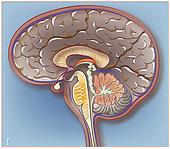WINTER HARVEST

In a forthcoming book, “Final Exam: A Surgeon’s Reflections on Mortality,” Dr. Pauline W. Chen writes about the many operations she performed on brain-dead patients for the purpose of procuring, or “harvesting,” their organs for transplantation. “They all,” she writes, “seemed remarkably alive.”
This past fall, the prestigious journal Science published a report on a young woman who, after a devastating car accident, was declared vegetative. For five months, she showed no signs of awareness whatsoever. Scientists, though, decided to put her in a Functional Magnetic Resonance Imaging scanner, a machine that tracks blood flow to different parts of the brain and that was only developed a few years ago. When they asked her to imagine things like playing tennis and walking through her home, the scan lit up with telltale patterns of language, movement and navigation indistinguishable from those produced by the brains of healthy, conscious people. The report’s authors, while stressing that the patient may still be classified as “unconscious,” conclude nonetheless that she has a “rich mental life.”
Ten years earlier, a patient like the young woman would have been assumed, for all practical intents, to be – effectively, if perhaps not legally – lifeless. Only the development of a new diagnostic technology has now rendered her more obviously alive. It’s hard not to wonder what technologies might one day yet be developed – or what aspects of consciousness might forever elude scientific instrumentation.
The acronym DCD might be mistaken for some new medium of music reproduction but in fact refers to “donation after cardiac death” – the procurement of organs from people whose hearts have stopped, even if their brains may still be functioning. Such procedures have taken place in many countries, despite the fact that the cessation of heartbeat is not necessarily irreversible. Even some patients whose hearts did not respond to cardiac resuscitation, it is well documented, have “come back to life” – in one case after the lapse of a full seven minutes, certainly sufficient time to harvest a vital organ or two.
The driving force behind the scramble to define death “to the instant” is clearly the worldwide shortage of organs for transplant. This past summer, doctors at the World Transplant Congress in Boston were told how the pool of available organs in the United States could increase by up to 20% if DCD were adopted more widely.
What does Judaism have to say about all this? Saving a life is a most weighty imperative, to be sure, but Jewish religious law, or halacha, does not permit one life to be taken to save the life of another – no matter how diminished the “quality” of the life of the former, no matter how great the potential of the life of the latter.
Halacha requires that death be clearly established, and does not permit any action that might hasten the death of a person in extremis. Any harvesting of organs after cessation of heart function that might not be permanent would be forbidden.
Unrelated to DCD is “brain death” – a diagnosis of irreversible cessation of all brain function, which modern medicine and secular law consider sufficient to permit the “harvesting” of organs before removal of life-support. What does Jewish law have to say about “brain death”? Can a patient with no discernable brain activity but whose heart continues to beat be considered a corpse?
Some rabbis vote yea on that question. And a recent New York Times article about a conference organized by the “Halachic Organ Donor Society,” an organization advocating increased organ donation from halacha-observant Jews, referred to “near unanimity among rabbis on the criteria for organ donation” – presumably referring to the next paragraph’s citation of the chief Sephardic rabbi of the Israeli city of Tzfat, whose criterion is brain death.
But many, and considerably more prominent in the world of halachic discourse, are the rabbinical authorities who do not agree. They include the late Rabbi Shlomo Zalman Auerbach, who was renowned as one of our generation’s most authoritative halachic decisors, as well as Rabbi Yosef Elyashiv, considered by many Jews to be the most authoritative authority of Jewish law today. Some leading scholars at Yeshiva University too, like Rabbi Herschel Schachter and Rabbi J. David Bleich, concur.
In her book, Dr. Chen writes about her “83rd procurement” when the brain-dead body she sliced open for its organs was that of a young Asian-American woman like herself, who reminded her vividly, so to speak, of herself. She found herself hesitating during the procedure, but managed to complete it, although as she cut the vena cava and watched the patient’s blood drain into canisters, she felt “as if my own life force were draining away.”
Dr. Chen may intend her account to be simply what the title of her book promises, a reflection on mortality. But perhaps another thought for consideration lay there on the operating table, the idea that despite the inevitability of its end, life is holy – and we do well to tread carefully and slowly before considering it gone.
That might explain the feeling she writes she had at the end of that 83rd procurement, an exhaustion born not only of “sleep deprivation [and] overwork” but of “an unbearable grief.”
by Rabbi Avi Shafran
Posted in: Hot Topics


